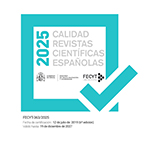La violencia de género en Marruecos: una aproximación a la realidad social y al debate ideológico
Resumen
Este artículo tiene un doble objetivo: en primer lugar, indagar en la prevalencia de la violencia de género en Marruecos y en las estrategias de la acción gubernamental contra este tipo de violencia desde los años 80 del siglo XX hasta la actualidad. En segundo lugar, y retomando algunos referentes teóricos de la subalternidad, analizar las principales tendencias del debate que existen en Marruecos en torno a este tema. Basando la metodología en el análisis de datos estadísticos oficiales y de fuentes secundarias, se incide en el aumento significativo de la violencia contra las mujeres a lo largo de los últimos años y en los factores que la caracterizan. Entre otras aportaciones, este estudio pone en evidencia que Marruecos no solamente se inició tarde en la lucha contra la violencia de género, sino que denota una falta de voluntad política para ejecutar de forma eficaz las diferentes estrategias de acción y los compromisos internacionalmente adquiridos. En cuanto a las tendencias del debate, dos son las preponderantes, de tal forma que la sociedad civil más comprometida con la violencia de género reclama espacios de laicidad en el marco de los referentes universales más vanguardistas, mientras que el modelo islamo-islamista, en el que se ubica el gobierno de Marruecos desde el acceso al poder del Partido de la Justicia y el Desarrollo (PJD) en 2012, propone una interpretación/adaptación de ciertas especificidades culturales, históricas y nacionales, impregnadas de valores religiosos.
Descargas
Descarga artículo
Licencia
La revista Investigaciones Feministas, para fomentar el intercambio global del conocimiento, facilita el acceso sin restricciones a sus contenidos desde el momento de su publicación en la presente edición electrónica, y por eso es una revista de acceso abierto. Los originales publicados en esta revista son propiedad de la Universidad Complutense de Madrid y es obligatorio citar su procedencia en cualquier reproducción total o parcial. Todos los contenidos se distribuyen bajo una licencia de uso y distribución Creative Commons Reconocimiento 4.0 (CC BY 4.0). Esta circunstancia ha de hacerse constar expresamente de esta forma cuando sea necesario. Puede consultar la versión informativa y el texto legal de la licencia.











